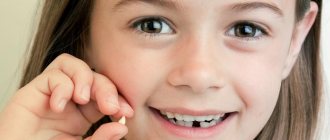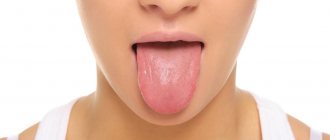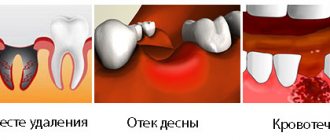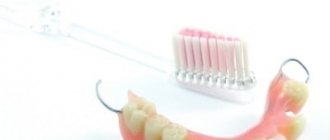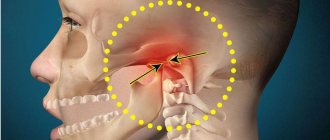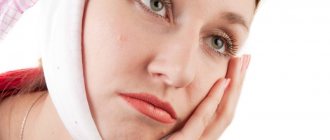Toothache is one of the most unbearable and painful sensations for a person. It occurs due to pathological processes in the tooth or surrounding tissue that affect nerve fibers. Paroxysmal pain affects mood, activity, sleep, and in especially severe cases leads to neuropsychiatric disorders. What are the causes of toothache and why does its intensity increase at night?
Why do my teeth hurt at night but not during the day?
It would be more correct to say that your teeth hurt more at night. During the day there are too many distractions that prevent you from focusing on your feelings. Work, household chores and even simple walking force the brain to work in a different direction, which leads to less pain.
Another, main factor is physiological. In the evening, the level of corticosteroids in the body begins to decrease; they are “responsible” for reducing pain. Hormone production reaches a minimum between midnight and five in the morning, after which the tooth gradually begins to fall out. Usually by this time the exhausted body “gives up”, the person falls asleep and gets a short respite.
Another cause of night pain is the horizontal position of the body during sleep. The rush of blood to the head increases, while the nerve roots are compressed and the pain intensifies. This is especially noticeable with pulpitis, when the sensations become unbearable.
Important.
If you notice increased pain while lying down, raise the pillow higher and practically sit down. The blood will drain from your head and it will become a little easier.
It’s a special problem when the tooth under the filling hurts. This means that an infection has entered the treated cavity and an inflammatory process has begun. The resulting pus, even in a minimal amount, has no way out and begins to compress the nerve roots, which leads to severe acute pain that can even radiate to the ear and throat.
At night, it is also possible to experience minor pain after the removal of a tooth or nerve, as well as after treatment of deep caries. This is normal and does not require any serious measures to be taken. In this case, it is enough to take a tablet of any analgesic or rinse your mouth with a warm soda solution.
Important.
If you had a difficult removal and then experienced severe pain at night, you should immediately consult a doctor in the morning. Alternatively, bone fragments could remain in the socket. In this case, the entire jaw will hurt, and it will be almost impossible to relieve the sensation even with strong medications.
Possible reasons
Painful sensations in the pulp are always associated with infection. Its penetration into the body is determined by three factors - physical, chemical or biological. Physical factors include overheating of tissues, traumatic fracture of the dental crown, and pathological abrasion of teeth. Pulp stones (dentin formations) can also cause severe paroxysmal pain. They put pressure on blood vessels, which disrupts microcirculation, irritates nerve endings and provokes the development of edema.
Chemical or iatrogenic factors are always associated with unqualified actions of the dentist. Among them are violations of the rules for using etching gel (necessary for filling teeth), the use of low-quality/toxic filling materials, and strong antiseptics for treating cavities.
Biological factors include cases of infection entering simply into the pulp chamber (for example, during caries). The risk of tissue infection increases with a secondary caries process that develops under the filling. The infection can also enter through the dentinal tubules or the apical foramen (located at the top of the tooth).
Pain appears immediately after inflammation of the pulp. It is spontaneous, but can intensify after mechanical impact on the tooth. Attacks of pain last from 10 to 30 minutes and in some cases are not amenable to drug pain relief. What to do? Contact your dentist as soon as possible and undergo treatment.
Dead tooth hurts
After the nerve is removed, the tooth may respond for some time with mild pain to pressure or biting, including at night. This is a normal reaction. In these cases, it is enough to take a painkiller tablet.
If the pain becomes twitching and intensifies, it means that the nerve was not completely removed or the doctor made mistakes related to cleaning the canals or installing a filling. The biggest problem is that neither pills nor folk remedies will help. Start looking for a doctor right away.
Private dentistry
Acute toothache caught you by surprise at night? People who do not want to spoil their nerves immediately understand where to go: private dental offices or clinics that work around the clock. Here, the service for dental treatment and pain relief, in most cases, will have to be paid according to the current price list. But help will be provided in a timely manner, without unnecessary hassle or questions, and you will feel comfortable.
Some private dentistry may provide free services under the compulsory medical insurance policy, but most often in such cases they ask to provide one more document: SNILS.
You can contact 24-hour private dental clinics
Also, most private dental centers have uninterrupted 24-hour and toll-free communication lines for support and consultation of patients. Therefore, you can always call such a service and get clear recommendations on how to proceed.
Wisdom tooth hurts
A special unit in our body is the wisdom tooth. It usually erupts at the age of 18-25 years, and severe pain may occur. The molar breaks through the bone and gum tissue, essentially tearing it apart. At night, the pain may intensify; it can be relieved with the help of pain-relieving gels (Cholisal, Metrogyl Denta, Asepta) or analgesics.
It’s good if the tooth runs vertically and has enough space in the gum. A much worse option is when the molar breaks through at an angle or even horizontally. The “figure eight” puts pressure on the roots of neighboring teeth and displaces them. In addition to pain, swelling of the gums and cheeks may appear, as well as an increase in body temperature. As a temporary option, you can take painkillers, but the problem will have to be resolved with a surgeon. As always, the sooner the better.
A wisdom tooth can simply hurt due to caries, pulpitis, periodontitis, or cysts. Another reason is inflammation of the so-called hood, a fold on the gum that forms when teeth erupt. The cause of pericoronitis is the accumulation of food particles, which gradually begin to rot, accompanied by pain in the “eight” area. In the most severe situations, pus begins to secrete.
To relieve pain, you can rinse your mouth with warm infusions of herbs (sage, chamomile), use a gel and take a pain reliever. And in the morning - to the doctor.
Important.
A wisdom tooth is also a tooth. But, if it interferes with the normal position of the teeth, causes crowding, or if the dentin is deeply damaged, dentists recommend removing it.
Urban emergency dental care centers
As a rule, these are ordinary clinics, which are supported by the state and the city, or an emergency room at a regional dentistry, where round-the-clock duty is organized. But even in the largest cities, such as Moscow, there are no more than one or two of them for the entire population. These clinics have an on-call room where you can go to resolve an emergency.
To be accepted at night or on holidays, it is enough to provide an identification document and a compulsory health insurance policy. It does not matter whether you belong to this organization at your place of residence or your official registration. It also does not matter which clinic you are assigned to.
For example, in Moscow there are two night departments: for children under eighteen years of age, you can count on help in emergency cases at Dentistry No. 28. The center’s specialists provide their services free of charge from 18:00 to 8:30 on weekdays. And also at any time of the day or night on holidays and weekends. For adults - emergency admission of all citizens is carried out by the State Budgetary Healthcare Institution 1 "Maxillofacial Hospital for War Veterans", opening hours from eight in the evening to eight in the morning.
Clinics that are supported by the state
For what types of pain and dental pathologies can specialists provide assistance at night:
- relieve acute pain syndrome in any type of dental problem,
- provide first aid for pulpitis, caries, periodontitis, alveolitis and periostitis, the presence of cysts and granulomas,
- stop alveolar bleeding,
- carry out emergency surgical intervention if the patient presents with jaw injuries, fractures and dislocations of teeth,
- remove a tooth: but not in the case of “eights”. Wisdom teeth removal is often considered difficult and requires a thorough diagnosis of the situation. Therefore, depending on the clinical case and the equipment of the clinic, the doctor may recommend that you come for an appointment during the daytime and make an appointment (although in case of an emergency, city clinics accept patients without an appointment).
Services here will be provided free of charge. The only thing you may need to pay for is an imported anesthetic injection before treatment.
“I am shocked by our city clinic in Chita. We arrived at night, there were four people in line for one doctor, we sat there for two hours. The pain was unbearable, the pills did not help. At the same time, the tooth was intact, there wasn’t even a filling on it, and it was unclear why it hurt. The doctor was rude and said, why are you coming here! You'd think we have nothing else to do at night! Without even looking properly, without x-rays and everything else, she offered to pull the tooth and pay 300 rubles for anesthesia!!! But shouldn’t modern dentists do everything to save the patient’s teeth and how can they be removed without even conducting a normal diagnosis? This is our free medicine and emergency care. The question arises: why be on duty at night if there is only one answer to all situations: we will delete them!”
Marina, woman.ru
Reasons not related to teeth
With severe toothache, it seems that everything hurts - the ear, throat, head and even the skin on the face. In some cases, a person is not able to determine the source of the sensation and believes that a bad tooth is to blame.
Night pain similar to toothache can also occur in the following cases:
- For inflammation of the trigeminal nerve. Characterized by a nagging, severe pain, localized in the area of one tooth or spread throughout the entire jaw. This is explained by the fact that the branches of the nerve are located very close to the roots of the teeth and when they become inflamed, pain occurs that is very similar to toothache.
- For sinusitis, sinusitis, otitis media. Swollen tissues and sinuses filled with purulent contents put pressure on the roots of the teeth. The resulting pain is very similar to toothache. In most cases, it is observed in children who find it difficult to correctly determine the location of pain
- Under stress. Chronic night pain can be considered as one of the factors confirming the stressful state of the body.
Important.
Even if you have such assumptions, you will still have to visit the dentist. This must be done in order to exclude inflammatory diseases of the teeth and oral cavity, correctly diagnose and prescribe the correct treatment.
General characteristics of the condition
Severe paroxysmal pain indicates inflammation of the pulp (the inner tissue of the tooth). The pulp is localized inside the dental canal. It consists of a nerve, connective tissue cells and blood vessels. The main task of the pulp is to deliver vital elements to the hard tissues of the tooth. Inflammation of internal tissues is called pulpitis. Most often it develops when an infection occurs after long-term caries.
Content:
- General characteristics of the condition
- Possible reasons
- How to provide first aid?
- Features of therapy
- Is it possible to prevent pain?
- Why does pain worsen at night?
What to do if you have tooth pain at night
It is necessary to assume that at night the pain becomes much stronger than during the day. Physiologically, a person should already be resting, but he has to look for a way to alleviate his condition. The worst case scenario is when acute pain causes you to wake up.
In such situations, all thoughts are aimed at eliminating unpleasant sensations as soon as possible. It is unlikely that someone will prepare a complex decoction or tincture in the middle of the night.
We offer several quick solutions to help relieve the pain at least a little:
- Immediately take an analgesic - any one you have in the house. The group includes analgin, tempalgin, pentalgin, ketorol. Paracetamol will help. Be aware of the danger of overdose. Medicines begin to act approximately 20-30 minutes after administration.
- Apply something cold to your cheek. Take ice or a piece of meat out of the freezer; even a pack of dumplings will do. Wrap it in a towel and apply it to the sore cheek. The cold will help relieve swelling from the tissues, and the pressure on the nerve roots will decrease. It is important to remember that you need to take breaks every 15-20 minutes so as not to chill the trigeminal nerve.
- Rinse your mouth with a warm solution of baking soda - one teaspoon per glass of water. Repeat rinsing every half hour. It will not be possible to completely remove the pain, but it will become a little easier.
- Brew any herb that has anti-inflammatory properties - chamomile, thyme, oregano. Standard proportions are one tablespoon per glass of boiling water. Infuse, cool, strain. Rinse only with warm solution.
- Use folk remedies - apply a piece of lard to the sore gum, a clove of garlic to the wrist. If you have it in the house, you can rinse your mouth with vodka or cognac (do not drink, this is important) - at first you will feel a sharp pain, then it will become easier.
If you are tired and can no longer walk, lie down in a semi-sitting position. In this case, the head must be higher than the body.
To distract yourself, you can do some quiet work - ironing clothes, drawing, embroidering, writing notes. The main thing is that you can switch your attention.
You will need to survive the most difficult time - from midnight to five o'clock in the morning. In the morning, the production of corticosteroids will begin to increase, and the pain will subside a little. We recommend that you prepare for a visit to the doctor once. No one else will help you.
Do not ignore preventive visits to the dentist.
It is enough to visit a specialist 1 – 2 times a year, which will allow you to promptly identify any dental problem at an early stage of development. This means that its elimination will be quick, easy and without complications.
By clicking the “request a call” button you agree to the personal data processing policy.
What not to do if your tooth hurts
We consider it our duty to remind you of what you absolutely cannot do, even if the pain is very severe. Some of these recommendations may cause laughter, but such cases have been encountered in practice.
So, let's list:
- We don’t heat – we don’t use a heating pad, an iron, hot metal, we don’t lean our cheeks against a hot radiator. Heat provokes swelling, tissue pressure on the roots of teeth and nerves increases, and the pain becomes unbearable. Heating is also dangerous because pus can break through into the sinuses and skull tissue.
- We don’t take antibiotics - firstly, they won’t help, and secondly, such medications should not be taken without a doctor’s prescription.
- We don’t take no-shpu - it won’t help, the principle of action of the medicine is based on its effect on the transverse muscles. No-spa does not help with toothache.
- We don’t try to pull out a tooth or pick out a filling ourselves. There is a high probability of damage to the tooth, jaw and infection.
- We absolutely do not drink alcohol. If you smoke, try not to exceed your limit - excess nicotine will worsen the condition.
Important.
You cannot apply a piece of analgin tablet or any other painkiller to your gum or cheek; you will get a severe burn and tissue necrosis. And don’t delay the visit to the dentist, you still have to go.
Features of therapy
Even a slight throbbing pain in a tooth should be a good reason to visit a doctor. The sooner treatment is started, the more healthy tissue, money and nerves can be saved. It is important to understand that uncontrolled use of analgesics will not give the desired result. Temporary pain relief will be replaced by new severe attacks, complications, and the need for surgery.
Do not try to rinse, heat the tooth, or put any medications into it to numb the pain. This will provoke the development of complications and will only worsen the condition. The use of herbal preparations or traditional medicine should also be avoided.
How to relieve pain? The dentist must answer this question after examining the oral cavity and performing the necessary diagnostic procedures. Perhaps the inflammation is chronic, the tissue has begun to die, a large amount of pus has accumulated in the pulp chamber, and the patient needs emergency surgery. In this case, a few packets of painkillers will not solve the problem and will not bring the desired recovery closer.
If the inflammation is at the initial stage, and you simply do not have time to get to the doctor, take a previously familiar analgesic, and after a few hours go to the hospital. The main thing is that self-medication does not become the main or only method of combating pulpitis. Remember - the pain cannot be stopped, it will disappear only after the root cause is eliminated.
Don't ignore your toothache and be sure to visit your dentist. Lack of treatment can lead to tooth loss, inflammation of the entire jaw tissue and sepsis (general infection of the body).
Best materials of the month
- Coronaviruses: SARS-CoV-2 (COVID-19)
- Antibiotics for the prevention and treatment of COVID-19: how effective are they?
- The most common "office" diseases
- Does vodka kill coronavirus?
- How to stay alive on our roads?
When you can't put off visiting a doctor
Night pain is dangerous because a person does not have the opportunity to immediately go to a doctor and fix the problem. In particular, in the pre-dawn time, against the background of pain and anxiety, blood pressure may rise and a stroke may occur.
If you have severe night pain:
- body temperature increased;
- breathing became difficult;
- heart rate increased;
- severe swelling appeared on one side of the face;
- facial sensitivity on the affected side is impaired,
We call an ambulance and don’t wait for the condition to worsen.
In cases where the pain simply becomes unbearable and it becomes impossible to endure it, look for clinics or services that provide dental care around the clock.
Important.
Be careful when taking medications. Under no circumstances should an overdose be allowed, as this can lead to an allergic reaction, including swelling.
Immediate help
Any pain symptoms require following basic recommendations:
- Brush your teeth, whether you did it at night or not. Be sure to remove any remaining food that has settled between the teeth.
- Prepare a glass of water and mix it with a teaspoon of soda. This action will leave the tooth feeling fresh and clean and help reduce pain.
- Take painkillers .
Every family has the latter at home, however, it is important to take into account some nuances when using them.
Prevention of dental diseases
Preventive methods for dental diseases are very simple. It is necessary to maintain daily oral hygiene, visit the dentist 1-2 times a year, and monitor your diet.
If you are a smoker with or without experience, or a big fan of strong tea or coffee, be prepared for the fact that preventative cleaning will need to be carried out more often. Dental plaque is an ideal environment for the proliferation of pathogenic flora and, accordingly, the occurrence of inflammatory lesions on the teeth and in the mouth.
Food must contain sufficient amounts of phosphorus and calcium, vitamins, and microelements. Improper nutrition will lead to rapid destruction of dentin and tooth loss.
Particular attention to these factors should be paid to those who are prone to periodontal disease and periodontitis or are already sick with them.
Author: Elena Kopylova Dentist-therapist, endodontist, pediatric dentist. Work experience more than 7 years. The information is for reference only. Before treatment, consultation with a doctor is necessary.
Localization and nature of toothache
It's hard to go wrong with a sore mouth. A person can easily describe where and what hurts. Painful sensations can differ both in intensity (sharp and strong or weak and aching) and frequency (for example, at night - that’s another test). Toothache can affect one tooth or several in a row, on one or both jaws. The pain can radiate to the temple, affecting not only the eye and ear, but also causing migraines. Moreover, the trigger (trigger mechanism) for such sensations is not necessarily hot tea or cold ice cream. Sometimes a person describes their occurrence as “out of the blue.”
Let's try to summarize the types of toothache:
- Aching, sensations are dull and not intense.
- Shooting, sharp, in the form of sharp impulses, causing suffering.
- Sharp, unexpected, independent of the time of day.
- Long-lasting, “background”, tolerable, so the patient puts off seeing a doctor.
Each of the above types of pain indicates a particular pathology. With a timely visit to the dentist, there is every chance of maintaining a beautiful smile and healthy teeth. Otherwise, unpleasant consequences will not keep you waiting.

